INTERVIEW: Derry man Raymond Rogan Part 2 : ‘You trust in people to do the right thing’
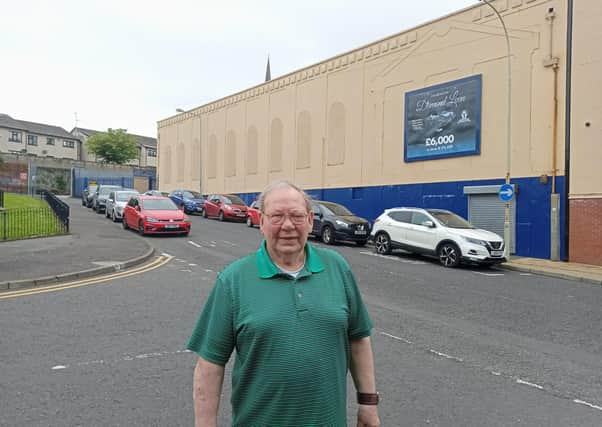

The Stardust is the stuff of legend in Derry and far beyond. During the showband era it had been a must-play destination on the national circuit.
The year was 1974, and the people’s priest, Father Edward Daly was about to be made Bishop of the Diocese. “This was his patch and me and him were good friends,” Raymond recalls of the late Derry cleric. “He used to come in here, and when he was made Bishop that was a very proud moment for me. I was chairman of the committee making all the arrangement for his ordination.
Advertisement
Hide AdAdvertisement
Hide Ad“I was very proud after he got up to make his speech and he thanked me personally. I was proud as punch with that. That was probably the proudest day apart from when I got married to Margaret that I can remember.”
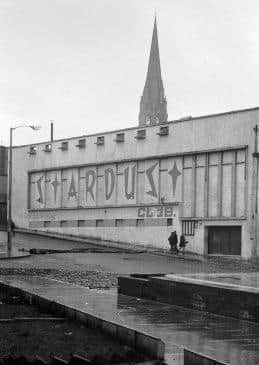

The new Bishop decided the parish needed a social venue to provide a hub for activities for the local community and to “distract young people from getting involved”.
Bishop Daly asked Raymond and administrator Dennis Mullan to look around and find some place that would suit as a parish centre. “The only place we could consider was The Stardust,” Raymond said.
At the time the Stardust at this was lying empty... or was supposed to be: “McIvor, the boy who owned the bar at Burnfoot, he owned the Stardust too but the Republicans were using it for bingo and he was getting all the bills.
Advertisement
Hide AdAdvertisement
Hide AdThe Stardust was well known because McIvor in years past had brought all the big showbands there. We agreed to take it and the parish bought the hall and we had to organise a whole renovation. It cost £87,000.
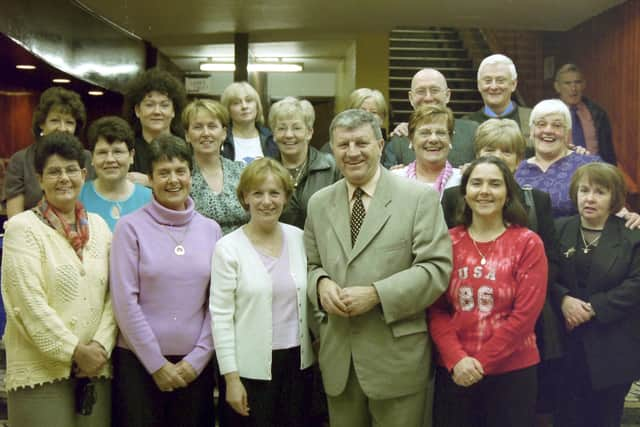

“They set up a committee to run it and there were lots of different organisations went into it to do activities,” Raymond recalls.
Popular as the massive venue was, the small group found themselves in a bit of pickle because there was no money being generated even to help cover the basic costs of running it.
“Take into account heating and lighting and insurance but there was no revenue coming in - there was an outlay the Bishop could ill afford because he had other churches to build - he established at least another four parishes in the diocese and built churches and parish halls so money was a big factor - and he talked to me and said, ‘We are going to have to take some action, either let it go or start charging everybody if something doesn’t happen’.
Advertisement
Hide AdAdvertisement
Hide Ad“One of the things I noticed about it was there was a lot of activity, a lot of people involved but nobody was taking any responsibility for the actual premises and said so. So he said to me, ‘what are you suggesting?’ I said there should be one single authority and everything goes on under their authority. He said to me, ‘Would you take it and I did it initially part-time’.
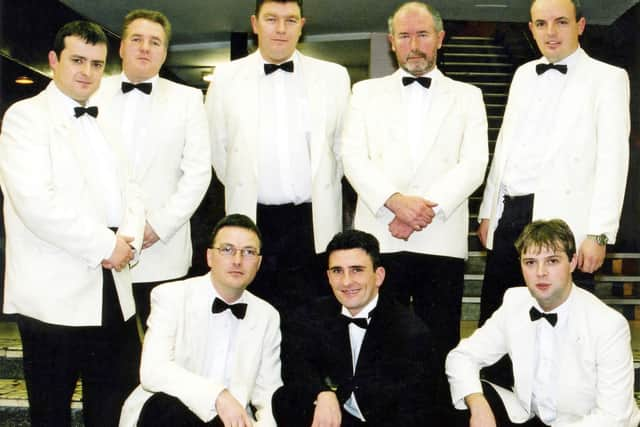

“I remember getting all the group together and I explained to them the reason why things were happening and the parish had to sustain itself and I would need help to do it and anybody that wanted to stay on as a member of a management committee could stay on and were quite welcome, but that the buck stopped with me I was the boss. It was a bit controversial, and quite a few walked out and my name was blackballed all over the place: ‘who does he think he is’ and all the rest of it, but one thing led to another and eventually I started organising a programme beginning with the youth.”
Raymond brought Fr Paddy O’Kane on as chaplain and programmes started to take shape. One of the lasting legacies was the constituting of many local youth sport organisations which are thriving to this day.
“There was a lot of youth activity going on, a lot of one street clubs, without any backing or financial support for rigs or travelling for football teams and so on,” Raymond recalls. “We done a survey and discovered there was quite a few of them, like big Jim ‘Ugg’ Clifford - he was doing a lot without any support, so Fr O’Kane and I formed St Eugene’s Youth Association and we approached the Education Board and we listed these organisations, these one street clubs. The reason they weren’t entitled to any grant aid was because there was no structure, no secretary, no chair so by virtue of enrolling with St Eugene’s Youth Association that entitled them to apply for grant aid through us.”
Advertisement
Hide AdAdvertisement
Hide AdRaymond was also instrumental in training up youth leaders such as Willie Barrett, and the man who’d later become Mayor, Pat Ramsey, “who was only about 17 or 18”. “We based them in the parish hall, and we formed the pre-school playgroup, the pensioner’s club, the bowling club, and each priest in the parish had his own patch so we got each priest to get people to have a social for their area in the parish hall and that generated funds for the parish and provided social activity for the parishioners.”
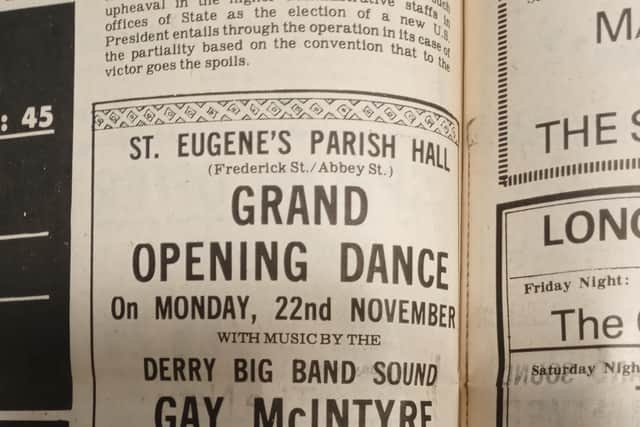

And as life returned to one of Derry’s largest and most popular venues, so too did the music.
“We had the Dubliners there and I remember we had Dana the year she won the Eurovision. That night we had big raffle for a massive big panda and I won it!” he laughs. “We had the Bay City Rollers there, The Undertones. It had been a big showband venue long before the parish took it over.”
Raymond said people were delighted it was back open. “Willie Deery came to me then and he started these reunions, the Springtown reunions. There was also the Corinthian reunion - that started a whole new ball game and we had some fantastic nights in there. I did a disco in there every Friday night for teenagers and that was good. They used to come from all over the place.
Advertisement
Hide AdAdvertisement
Hide Ad“The thing about the parish hall it was available for charitable purposes, saying somebody needed an operation and had to go out foreign, the neighbours would help the family organise a do in the parish hall. I had a special fee or situations like that. I only charged them a minimum free to cover costs.”
Despite his numerous other commitments and roles, at around the same time Raymond also took on starting up St Eugene’s Youth Club and went to Monsignoir Coulter who was then president at St Columb’s College to see about a potential venue. “My youngest went to the College and they had these Nissan Hts they were getting rid of. He charged me £200 for it and I was looking for a place to put this Nissan hut for the youth club.” And it was here Raymond’s many differing sstrings to his bow proved beneficial again.
“I was a member of the Western Area Health & Social Services panel and I explained to chief executive of the board Tom Frawley that we were looking for somewhere to put it and he said, ‘Look I know the Post Office people well, I’ll have a word’ and he got approval for me to put that Nissan Hit up there on yther old post office site (where Abbey House is now) and Pat Ramsey and Willie Barrett were the two men involved in that. And it was doing very well but there were a few bads boys about and it was vandalised.
“The upshot of that story is when we started the Youth Association then after we were associated with the site and the Post Office came to me and said we will be willing to sell you that site and I went to the Bishop and said to him and he said if it was a reasonable price we’ll buy it. They asked for £10,000 and the Bishop said, ‘Grab it’. That site was then later swapped with the Housing Executive for the site for Holy Family chapel at Ballymagroarty.”
Advertisement
Hide AdAdvertisement
Hide AdRaymond laughs as he admits that he used the legend of the ghost story associated with The Stardust, a certain Sergeant Hankie, on occasion to keep the young ones in tow.
Throughout the years, the Stardust was pivotal in providing some much needed respite and social space for everyone, and Raymond has many brilliant memories. He also helped young people get skilled in professions through the Action for Community Employment (ACE) scheme at the venue, completing a training course to become a supervisor to run the scheme. “We used to do all the cleaning, maintenance and repairs to the parish hall and it wasn’t costing the parish a penny. Fr Neal Carlin who runs Columba House was just starting St Anthony’s Retreat and we got an ACE scheme to help him in there. You were employing people.”
He said it is sad to see The Stardust today lying unused. The building was sold by the Church to the Credit Union some years ago, and Raymond suggests it maybe should one day be restored to provide a vital community resource and entertainment venue. “Given the situation there isn’t a lot going on or senior people 50 plus,” he said. “Where do they go? There’s nowhere for them to go and Sunday night over there at the Stardust they could have a wee bar, a bit of music.”
A life long pacifist, Raymond had taken on many roles throughout the Troubles including as United Nations Association community and welfare officer role, his roles as chairman of both the Abbey Street Tenants’ Association and the Bogside Community Association. He also chaired the Western Area Housing Benefit Housing Benefit Appeals, the Derry, Strabane and Limavady Health Council, the Credit Union Supervisory Committee, and the Western Area HSS Council panel, and was at various times a member of the Magilligan Prison Visitor’s Committee, secretary of St Eugene’s Parish Council, and chairman of the aforementioned St Eugene’s Parish Centre and St Eugene’s Youth Association.
Advertisement
Hide AdAdvertisement
Hide AdLater on in life when his wife Margaret took ill Raymond was still chair of Western Area HSS Council. “I wanted to retire to look after my wife and they wouldn’t let me. My office was in Omagh, and I was still looking after the parish hall, so they gave men an office in Gransha but Margaret then contracted Alzheimer’s so I just had to leave it. I just dropped everything and kept her at home.”
True to his wedding vows back in 1957, Raymond cared for his wife right up until she passed away 15 years ago, and he still speaks with great affection and pride of the woman who was clearly the great love of his life.
And family remains the centre of his world. He is equally proud of their children, and speaks fondly of all they have achieved. “I have 16 grandchildren and 17 great grandchildren and that keeps me busy. I love them all and enjoy getting round them all. It keeps me young.”
These days Raymond enjoys travelling and still keeps an eye on what is happening in the city and in politics. “Things have come a long way but I have strong views on the political situation,” he said. “A lot of people who voted DUP should be considering their position because up until recently it was ‘no, no, no’. They have to reconsider their position because where have they come to?
Advertisement
Hide AdAdvertisement
Hide Ad“The big hope we have is the young people will no longer accept what is happening in terms of the way the country has been run. They have wasted millions.”
And glancing back at an extraordinary life and career, he provides what could double up as sage advice for those at the helm in politics and in wider society today: “You trust in people to do the right thing. That was one of the main factors that carried me through. If there’s any spark of decency about them at all they respond... that’s my feeling.”
*With special thanks to Frankie McMenamin for his research and assistance with facilitation.